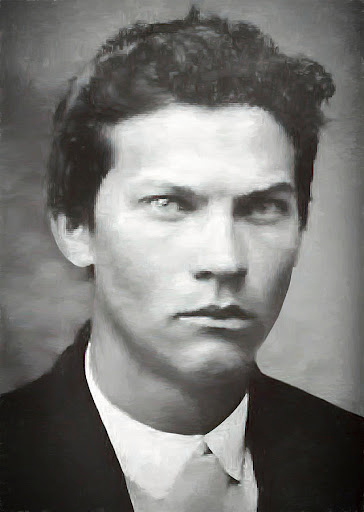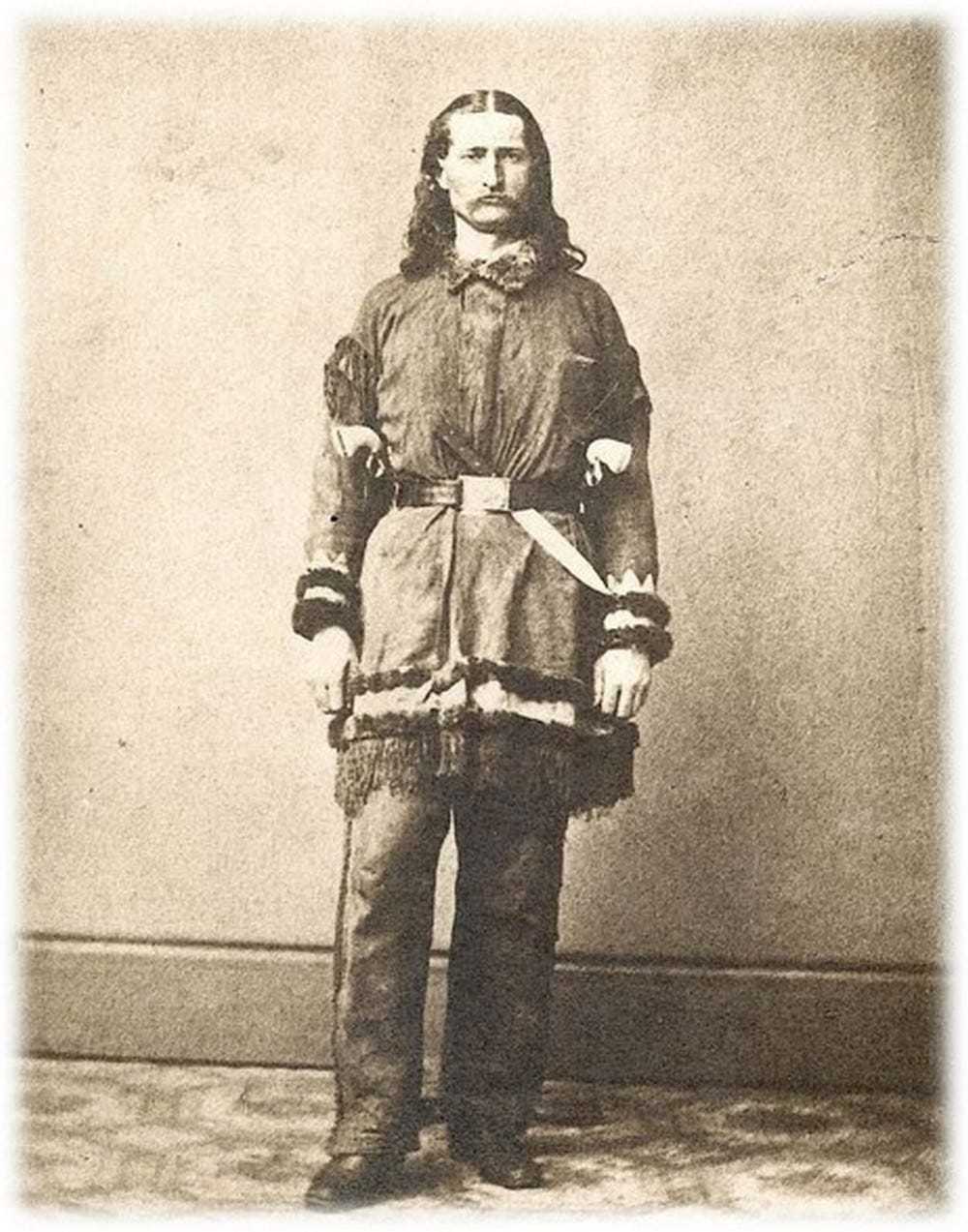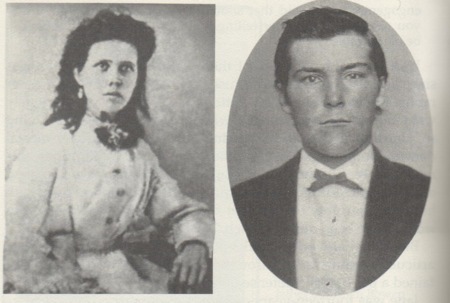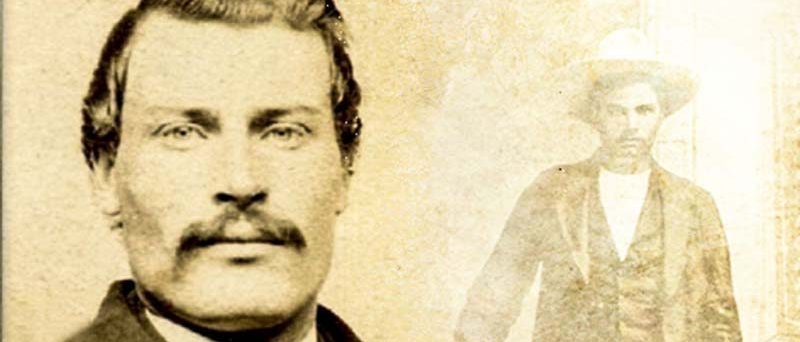John Wesley Hardin: Shot a Man for Snoring
Posted on 16th September 2021
Born in the town of Bonham, Texas on 26 May 1853, John Wesley Hardin was a borderline psychopath and a racist who had no qualms about killing, was comfortable with the things he did, and never displayed any remorse for having done so; and despite being a notorious braggart who shamelessly exaggerated his own exploits there is little doubt that he was responsible for a great many deaths. He was one of the least attractive of those anti-heroes to emerge from the Old American West.
His father James Hardin was a Methodist preacher who had named his son after the founder of the movement, but the young John Wesley never showed any inclination to follow in his father’s footsteps instead displaying a fascination for guns from an early age he had been greatly affected by the sight of returning Confederate soldiers following their defeat in the Civil War and deeply regretted not having been old enough to fight. Now he had to endure living in a State under armed occupation and he developed a visceral hatred for the freed blacks he saw all around him who he blamed for having brought the South to its knees.
With a point to prove it was woe betide the black man who crossed his path.

When he was aged just 15, he challenged a freed slave named Mage to a wrestling match.
For John Wesley this was no sporting encounter but a fight that demanded levels of violence beyond the normal rules of engagement so despite severely scratching Mage’s face and a profusion of blood he refused to end the contest and the two men had to be physically pulled apart.
Furious at his treatment Mage sought revenge and armed with a club ambushed Hardin the following day. Declining the opportunity to resume the fight Hardin instead simply drew his pistol and shot the man dead. He could conceivably have claimed self-defence but instead decided to flee. He later wrote:
“To be tried at that time for killing a negro meant certain death at the hands of a Court backed by Northern bayonets. Thus, unwillingly, I became a fugitive not from justice, be it known, but from the injustice and misrule of the people who had subjugated the South.”
After spending some considerable time in hiding, Hardin’s whereabouts were finally discovered, and three Union soldiers were sent to arrest him. Forewarned of their approach by his brother Joe he claimed to have set an ambush and killed all three but it’s just as possible he fled before they arrived.
Some months later he re-emerged in the town of Towash where playing poker with a man named Jim Bradley a row broke out over Hardin winning all the hands. Bradley accused him of cheating and threatened to cut him. Wanting to maintain a low-profile Hardin refused to rise to the bait made his excuses and left but Bradley his wrath fuelled by alcohol refused to let the matter lie and followed Hardin out of the saloon and into the street where calling him a son-of-a-bitch he drew his pistol and fired, but missed. Hardin responded by drawing both his pistols and shooting Bradley once through the chest and once through the head. The unfortunate Bradley died instantly.
Even at the tender age of just 17 John Wesley Hardin was an accomplished gunman and an eyewitness to the incident described how he had his holsters sewn into his waistcoat with the handles of his pistols pointing inwards and how he crossed his arms to draw. Hardin later said that he found this the fastest way to do so and that he practised it every day.
On 20 January 1870, in Horn Hill, Texas, he shot dead a man following an argument at a circus.
A week later he was escorting a saloon girl home when they were stopped by a man at gunpoint demanding money. Hardin took the change he had and threw it on the ground, as the robber stooped to pick it up, Hardin shot him in the back of the head.
Hardin now left Texas which was getting a little too hot for him and moved to Kansas where he worked for a time as a ranch hand. He could not however steer clear of trouble and in a dispute involving his employer and a Mexican rancher he found himself unable to stand aside as what had started out as a shouting match soon descended into a fight during which the Mexican fired at Hardin, the bullet passing through his hat.
The fight was broken up and a truce called but Hardin refused to shake the Mexican’s hand. Later that night he sought his adversary out in town and shot him dead.

Tired of working for a living Hardin thought he would try his hand at gambling and moved onto Abilene where Wild Bill Hickok was Town Marshal.
Hardin’s reputation was growing fast but Hickok was already a legend of the West and the likelihood of a confrontation between the two men appeared high. He was after all a wanted man with a bounty on his head and it would be Hickok’s responsibility to arrest him if he could.
Hickok was not popular in the town maintaining law and order whilst lining his own pockets often at the expense of others looking to do the same and some of the town’s more unscrupulous citizens approached Hardin (who despite adopting an assumed name did little to maintain the secret) and attempted to rile him into confronting Hickok: “He’s a damned Yankee, and he kills rebels for fun,” they told him. But he was no fool however and ignoring the financial inducements that were also on offer replied in no uncertain terms: “If you want to kill Hickok, do it yourself.”
He had a healthy respect for Hickok and wasn’t about to test the popularly held belief that he was the finest gunman in the West and so when he was asked to comply by the local by-law and hand in his guns, he did so. Once it became evident that he would be no trouble they were later returned to him.
It was in Abilene however, that one of the most notorious incidents of John Wesley Hardin’s life was to occur.
He was in his hotel room one night and unable to sleep because of another man’s snoring in his frustration took out his pistol and fired two shots into the ceiling. The likelihood is that he merely intended to wake up his noisy neighbour but instead the bullets killed him. Aware that the confrontation with Hickok he had so tried to avoid was now inevitable he escaped through a window fleeing across the roof top of the hotel. Sleeping overnight in a haystack on the outskirts of town he stole a horse in the morning and fled Abilene with Hickok and his deputies in hot pursuit.
Writing later of the incident he seemed irked by the reputation he had since acquired as a result: “They write so many lies about me, they say I killed six or seven men for snoring when I only actually ever shot one.”

Having successfully eluded Wild Bill, Hardin now returned to Texas. There he married his childhood sweetheart Jane Bowen, a quiet and respectable girl who was the daughter of a local storekeeper. She was to bear him two children and even though he was to remain an absent husband and father she remained devoted to him and refused to believe he was capable of all the misdeeds of which he was accused.
Although he knew he was a fugitive from justice in the State and that a warrant had been issued for his arrest he felt at home in Texas and more secure in the company of people he knew, but he was incapable of staying out of trouble.
In August 1872, in the town of Trinity he became involved in yet another dispute over a poker game with an old foe, Phil Sublett, during which he was shot. Suffering from shotgun wounds he was confined to his bed where in great pain and with a raging fever he convinced himself that he was dying. So, he decided to come clean about his misdeeds, confess his sins, hand himself into the Authorities and submit himself to what he was convinced would be a righteous justice.
He was taken into custody but with his health restored, informed of the many murders he was to be charged with and fearing death at the end of a noose, he escaped by cutting through the bars of his cell window.
Hardin now sought sanctuary with his family and for a time he worked on the ranch of his cousins the Clements, but he soon became involved in a feud between friends of his cousins, the Sutton’s, and their rivals the Taylor’s.
It was as usual a dispute over money and the Taylor’s, having sought legal advice on the issue knew they had the law on their side and so called upon Deputy-Marshal Jack Helm to settle the dispute. In response to a plea from the Sutton family, Hardin decided to take matters into his own hands. In May 1873, he shot and killed Deputy J.B Morgan when he tried to issue an arrest warrant. When Marshal Helm turned up at the Sutton home to investigate the incident Hardin shot him dead, also. Yet again he was forced to go into hiding.
But it wasn’t long before the Authorities caught up with him and he was arrested and charged with murder, not for the killing as it turned out of Marshal Helm but for one of his pursuers Marshal L.J Hoffman. Whilst being transferred to Waco to stand trial he managed to escape killing Deputy Jim Smalley in the process.
Hardin now fled in some haste to Florida where he became involved with mob that attacked a County Jail where a black man accused of assaulting a white woman was being held. During the attack the jail was burned down, and the accused man killed, and Hardin suspected of being the ringleader fled back to Texas.
On 26 May 1874, he was in a saloon celebrating his birthday with family and members of the gang he had formed during the Sutton-Taylor dispute when Sheriff Charles Webb arrived with an arrest warrant. When Hardin asked Webb if the warrant was for him, he responded no, and so Hardin invited him for a drink. Moments later Sheriff Webb was shot dead.
Hardin managed to elude the posse that was formed to track him down, but his brother Joe and cousin’s Bud and Tom Dixon were not so lucky and taken into custody were accused of the murder.
Sheriff Webb had been popular locally and angry that once more the real culprit had escaped justice a lynch mob formed that broke into the jail where Hardin’s relatives were held, dragged them out, and hanged them from an improvised scaffold.
On 20 January 1875, Texas Governor Richard Bennett Hubbard issued a $4,000 reward for the capture of John Wesley Hardin, Dead or Alive.
Hunters as well as Texas Law Enforcement were on his trail was constantly on the move travelling between Florida, Alabama, Texas and all points in-between. When he was confronted by two ex-slaves who were looking to claim the reward, he shot one dead and blinded the other. But as ruthless as he was, he could not evade justice forever. Eventually he was tracked down by Texas Rangers as he tried to board a train bound for Pensacola, Florida.
Seeing the Officer’s approaching Hardin was set on shooting it out with them but his pistols became entangled in the lining of his waistcoat and he was beaten to the ground and knocked unconscious before he could do so.
At his subsequent trial Hardin firm in his conviction that he would be sentenced to death remained defiant. But he had by this time become somewhat of a Texan folk hero and so despite being found guilty of multiple murders (27 according to the Authorities, 42 according to Hardin) he avoided the death penalty and was instead sentenced to 25 years imprisonment, of which he was to serve 17.
Hardin at first made several attempts to escape the prison in Huntsville that was to be his home for the next two decades but soon settled down and adapted to prison life.
Whilst incarcerated he studied for and gained a law degree and renewed his religious faith taking Bible Class.
On 6 November 1892, informed that his wife Jane had died he showed little emotion, did not seek permission to attend the funeral, or request time to grieve. Eighteen months later on 17 February 1894, he was granted a pardon by the Texas Governor on the grounds that he was a reformed character.
Hardin now decided to settle in El Paso where he established his own law practice and though he was often seen to be drunk and prone to violent mood swings for a time at least prospered and on 9 January 1895, he married 15-year-old Callie Lewis. With a new wife and not short of money that same year he settled down to write his life story.
On 19 August, the Widow Rose, real name Mroz, a prostitute and friend of Hardin’s was arrested for being drunk and disorderly and for brandishing a gun in public. Hardin unable to stay out of an argument confronted the lawman responsible for the arrest, John Selman Jr, and a furious row broke out during which it is believed Hardin threatened his life.
A threat made against your life by John Wesley Hardin wasn’t something to be taken lightly and Selman’s father, John Selman Sr, also a lawman, called on Hardin.
Selman Sr was a man who considered himself handy with a gun, but he wasn’t about to confront John Wesley Hardin so after initially reproaching Hardin for his behaviour he tried to smooth things over between him and his son but Hardin who could see and smell Selman’s fear would have none of it and after furiously trading insults Selman departed visibly shaken by the violence of Hardin’s temper, cowed, and some would later say trembling.
Later that same evening Hardin was playing poker in the Acme Saloon when John Selman Sr entered surreptitiously walked up to the table unannounced and shot Hardin through the back of the head.
John Wesley Hardin, possibly the deadliest of all the bad men to emerge from the Old West had been killed, and like so many of his victims, in cold blood.
Tagged as: Miscellaneous
Share this post:





